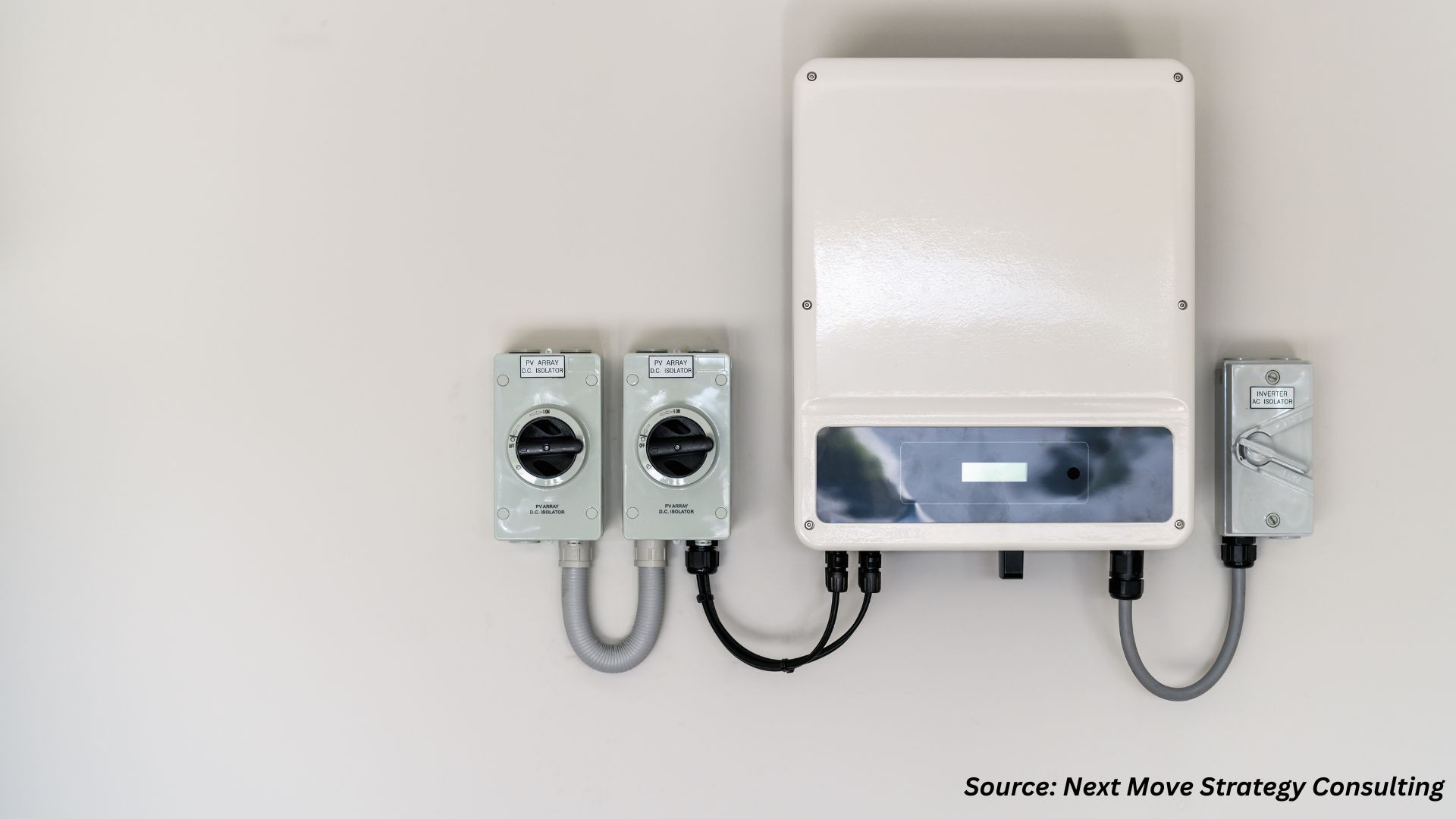
Power Management System Market by Component (Hardware, Software, and Services), by Module (Power Monitoring, Load Shedding, Power Simulation, and General Controls, Energy Cost Accounting, and Switching and Safety Management), by Application (Residential, Commercial, Industrial, and Others), and by End-User (Oil and Gas, Marine, Metals & Mining, Data Centers, and Others) – The Opportunity Analysis and Industry Forecast 2025-2030
Power Management System Market Overview
The Power Management System Market size was valued at USD 6.45 billion in 2024 and is predicted to reach USD 9.55 billion by 2030 with a CAGR of 6.8% from 2025-2030.
The power management system market experiences a strong upward trend due to renewable energy adoption that continues to grow while energy management technologies advance and electric vehicle adoption increases worldwide. Integration of novel power distribution with existing electrical infrastructure drives major obstacles within the market.
Conversely, AI and IoT integration for energy optimization creates ample opportunities artificial. Moreover, the key players involved in the market such as Schneider Electric, General Electric Company, ABB Ltd., are adopting various developmental strategies to maintain market dominance.
Market Dynamics and Trends
Increasing Adoption of Renewable Energy Sources Drives Adoption of PMS Globally
The growing acceptance of solar and wind energy applications worldwide creates increasing demand for sophisticated power management that interface variable energy inputs into conventional electricity networks.
The International Energy Agency states that, renewable capacity across the world is increased over 5 520 GW during 2024-2030 that is 2.6 times from the previous six years. As renewable energy generation is rising, PMS are essential for balancing supply and demand, ensuring grid stability, and optimizing energy distribution.
Integration of Advanced Technologies into PMS Drives Market Expansion
The integration of advanced technologies into energy management significantly propels power management system market demand, as these systems discharge electricity during periods of tight supply-demand balance, thereby helping to stabilize the power grid's equilibrium.
For instance, in March 2023, Sumitomo Electric launched an energy management solution that leverages SEMSA technology to facilitate multiple applications for grid storage batteries. This system gathers data from various power trading markets to develop optimized charging and discharging schedules, maximizing profitability for operators and enhancing the versatility of grid storage batteries.
The increase in Electric Vehicle Ownership Drives the Market Need for Power Management Systems
Growing worldwide EV adoption create increased demand for energy management systems as they underline essential elements for efficient EV operation. These systems control power distribution throughout the vehicle while directing battery power to both motor components and heating systems and other operational systems.
Car manufacturer statistics released by the International Energy Agency show electric car sales expanded 25% across the first quarter of 2024 when compared to Q1 2023 sales. The total number of electric car sales worldwide in 2023 exceeded 14 million units while representing 18% of total global car purchases. As more people choose electric vehicles the market requires additional sophisticated power management solutions to optimize vehicle performance.
Integration Complexity Hinders Power Management System Market Expansion
Integrating a new power management system with existing electrical infrastructure poses significant challenges, particularly in older buildings or systems that feature a variety of equipment. This process often necessitates extensive modifications and a high level of technical expertise, that hinder the seamless implementation of advanced power management solutions.
AI and IoT Integration for Energy Optimization Creates Ample Opportunities
Artificial intelligence (AI) together with Internet of Things (IoT) applications present a promising growth path for power management system market. Through analysis of connected device data with AI algorithms organizations gain the ability to optimize power usage while identifying consumption patterns and forecasting future energy requirements. This capability not only enhances operational efficiency but also supports sustainability initiatives, making it a key driver for future market growth.
Market Segmentations and Scope of the Study
The power management system market report is segmented on the basis of component, module, application, end-user, and region. On the basis of component, the market is divided into hardware, software, and services. Based on module, the market is classified into power monitoring, load shedding, power simulation, and general controls, energy cost accounting, and switching and safety management. Based on application, the market is divided into residential, commercial, industrial, and others. Based on end-user the market is divided into, oil and gas, marine, metals & mining, data centers, and others. The regional breakdown includes region such as North America, Europe, Asia-Pacific, and Rest of the world.
Geographical Landscape
North America Dominates the Power Management System Market Share
In North America, the rising adoption of smart and sustainable technologies into homes drives the market growth as these smart technologies often include features that allow for efficient energy monitoring and control, that is a key function of a power management system.
For example, in June 2024, ABB launched ReliaHome smart panel energy management solution in the U.S. and Canada. The platform ensures seamless functionality during power and network outages through a local-first network backup, enabling consistent customer connectivity independent of a cloud connection.
Also, the expansion of electric vehicles (EVs) within the area created rising power management system requirements as efficient vehicle operation requires systematic battery power management to distribute power across motors and heating components. The International Trade Administration reports new electric car registrations reached 1.4 million in 2023 in the U.S. with a 40% growth over 2022 statistics. The surge in EV across the region accelerates demand for advanced power management system to maintain operational efficiency.
Asia-Pacific to Witness Steady Growth in the Market
The Asia-Pacific area demonstrates steady market growth in energy efficiency primarily due to expanding renewable energy adoption and effective integration needs of renewable technologies.
The International Trade Administration forecasts China will become the global powerhouse of renewable energy by 2030 as it will drive 60% of worldwide capacity expansion. This shift requires PMS that are essential for balancing supply and demand, ensuring grid stability, and optimizing energy distribution.
In addition, sustainability initiatives act as a significant driver of the power management system market growth in APAC, as increasing environmental awareness and regulatory pressures compel industries to adopt eco-friendly energy management practices.
For example, in February 2023, SOCOMEC India launched its latest range of innovative and sustainable power management solutions at ELECRAMA. The products aimed at enhancing efficiency and reliability in power conversion, monitoring, and switching.
Competitive Landscape
The power management system industry comprises of various market players such as Schneider Electric, General Electric Company, ABB Ltd., Siemens AG, Eaton, Rockwell Automation, Emerson Electric Co., Mitsubishi Electric Corporation, Operation Technology, Inc., Delta Electronics, Inc., Yokogawa Electric Corporation, DEIF A/S, Royal IHC, TSL Products, and NXP Semiconductors, and others. These market players are adopting strategy such as business expansion to remain dominant in the market.
For instance, In November 2024, Eaton introduced their xStorage battery energy storage system (BESS) to commercial and industrial customers for decarbonization and electrification enhancements. BES provides three essential functions by maximizing site-based renewable energy benefits while also minimizing energy expenses and offering emergency power during power failures.
Moreover, in September 2024, Schneider Electric introduced an AI-powered home energy management feature for its Wiser Home app, designed to optimize energy consumption for major household loads such as water heaters and electric vehicle chargers. This innovative solution utilizes predictive algorithms to learn from user habits, real-time weather data, and energy tariffs, enabling automated load management that can significantly reduce energy bills.
Further, in October 2023, Eaton launched the Gigabit Network Card (Network-M3), enhancing connectivity and cybersecurity for backup power technologies. This innovation allows organizations to monitor IT power usage while providing robust protection against cyber threats, crucial for effective power management systems in an increasingly connected environment.
Key Benefits
-
The report provides quantitative analysis and estimations of the power management system market from 2025 to 2030, which assists in identifying the prevailing market opportunities.
-
The study comprises a deep dive analysis of the current and future power management system market trends to depict prevalent investment pockets in the market.
-
Information related to key drivers, restraints, and opportunities and their impact on the power management system market is provided in the report.
-
Competitive analysis of the players, along with their market share is provided in the report.
-
SWOT analysis and Porters Five Forces model is elaborated in the study.
-
Value chain analysis in the market study provides a clear picture of roles of stakeholders.
Power Management System Market Key Segments
By Component
-
Hardware
-
Controllers
-
Sensors
-
Switches
-
Relays
-
Gateways
-
Others
-
-
Software
-
Supervisory Control & Data Acquisition (SCADA)
-
Advanced Distribution Management Components (ADMS)
-
Outage Management Component (OMS)
-
Generation Management Components (GMS)
-
Others
-
-
Services
By Module
-
Power Monitoring
-
Load Shedding
-
Power Simulation
-
General Controls
-
Energy Cost Accounting
-
Switching and Safety Management
By Application
-
Residential
-
Commercial
-
Industrial
By End-Users
-
Oil and Gas
-
Marine
-
Metals & Mining
-
Data Centers
-
Others
Key Players
-
Schneider Electric
-
General Electric Company
-
ABB Ltd.
-
Siemens AG
-
Eaton
-
Rockwell Automation
-
Emerson Electric Co.
-
Mitsubishi Electric Corporation
-
Operation Technology, Inc.
-
Delta Electronics, Inc.
-
Yokogawa Electric Corporation
-
DEIF A/S
-
Royal IHC
-
TSL Products
-
NXP Semiconductors
REPORT SCOPE AND SEGMENTATION:
|
Parameters |
Details |
|
Market Size in 2024 |
USD 6.45 Billion |
|
Revenue Forecast in 2030 |
USD 9.55 Billion |
|
Growth Rate |
CAGR of 6.8% from 2025 to 2030 |
|
Analysis Period |
2024–2030 |
|
Base Year Considered |
2024 |
|
Forecast Period |
2025–2030 |
|
Market Size Estimation |
Billion (USD) |
|
Growth Factors |
|
|
Companies Profiled |
15 |
|
Market Share |
Available for 10 companies |
|
Customization Scope |
Free customization (equivalent up to 80 working hours of analysts) after purchase. Addition or alteration to country, regional, and segment scope. |
|
Pricing and Purchase Options |
Avail customized purchase options to meet your exact research needs. |




















 Speak to Our Analyst
Speak to Our Analyst

























